Corporations Law Assignment: Legal Entities, Liability, and Disputes
VerifiedAdded on 2023/06/04
|9
|2477
|184
Homework Assignment
AI Summary
This document provides a comprehensive analysis of three key issues in corporations law. The first answer examines the concept of separate legal entity and piercing the corporate veil, using the case of Bob who attempts to circumvent fishing regulations by forming a company. The second answer explores the liability of a parent company for the negligence of its subsidiary, referencing cases like Berkey v. Third Avenue Ry. The third answer focuses on the legal implications of removing a solicitor from a company, analyzing the roles of the company's constitution and replaceable rules and referencing cases like Eley v Positive Life Assurance Co Ltd and Hickman v Kent or Romney Marsh Sheep-breeders Association. The document uses case law and relevant legislation, including the Corporations Act 2001 (Cth), to support its arguments and provides conclusions for each issue.

Corporations Law
Paraphrase This Document
Need a fresh take? Get an instant paraphrase of this document with our AI Paraphraser
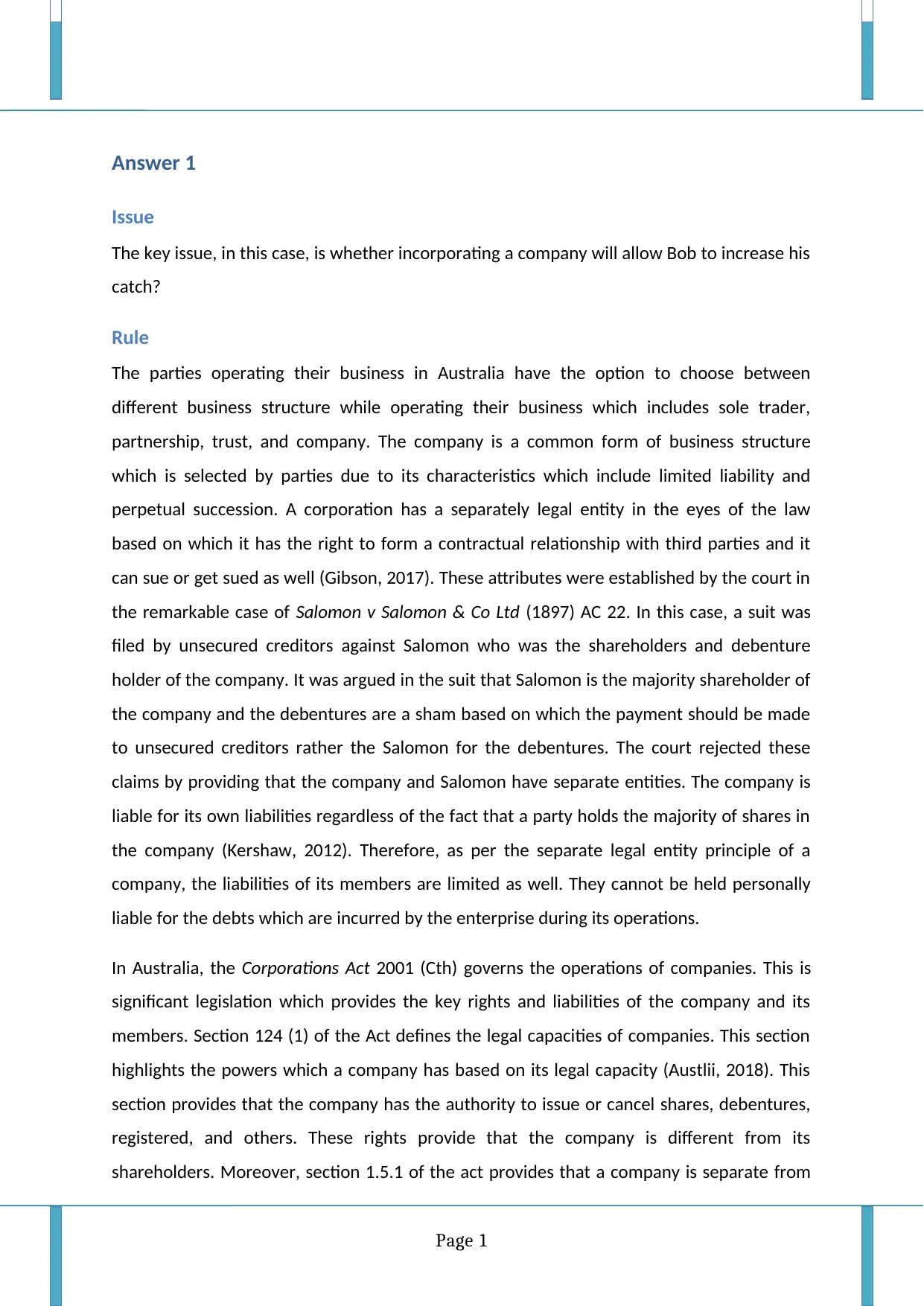
Answer 1
Issue
The key issue, in this case, is whether incorporating a company will allow Bob to increase his
catch?
Rule
The parties operating their business in Australia have the option to choose between
different business structure while operating their business which includes sole trader,
partnership, trust, and company. The company is a common form of business structure
which is selected by parties due to its characteristics which include limited liability and
perpetual succession. A corporation has a separately legal entity in the eyes of the law
based on which it has the right to form a contractual relationship with third parties and it
can sue or get sued as well (Gibson, 2017). These attributes were established by the court in
the remarkable case of Salomon v Salomon & Co Ltd (1897) AC 22. In this case, a suit was
filed by unsecured creditors against Salomon who was the shareholders and debenture
holder of the company. It was argued in the suit that Salomon is the majority shareholder of
the company and the debentures are a sham based on which the payment should be made
to unsecured creditors rather the Salomon for the debentures. The court rejected these
claims by providing that the company and Salomon have separate entities. The company is
liable for its own liabilities regardless of the fact that a party holds the majority of shares in
the company (Kershaw, 2012). Therefore, as per the separate legal entity principle of a
company, the liabilities of its members are limited as well. They cannot be held personally
liable for the debts which are incurred by the enterprise during its operations.
In Australia, the Corporations Act 2001 (Cth) governs the operations of companies. This is
significant legislation which provides the key rights and liabilities of the company and its
members. Section 124 (1) of the Act defines the legal capacities of companies. This section
highlights the powers which a company has based on its legal capacity (Austlii, 2018). This
section provides that the company has the authority to issue or cancel shares, debentures,
registered, and others. These rights provide that the company is different from its
shareholders. Moreover, section 1.5.1 of the act provides that a company is separate from
Page 1
Issue
The key issue, in this case, is whether incorporating a company will allow Bob to increase his
catch?
Rule
The parties operating their business in Australia have the option to choose between
different business structure while operating their business which includes sole trader,
partnership, trust, and company. The company is a common form of business structure
which is selected by parties due to its characteristics which include limited liability and
perpetual succession. A corporation has a separately legal entity in the eyes of the law
based on which it has the right to form a contractual relationship with third parties and it
can sue or get sued as well (Gibson, 2017). These attributes were established by the court in
the remarkable case of Salomon v Salomon & Co Ltd (1897) AC 22. In this case, a suit was
filed by unsecured creditors against Salomon who was the shareholders and debenture
holder of the company. It was argued in the suit that Salomon is the majority shareholder of
the company and the debentures are a sham based on which the payment should be made
to unsecured creditors rather the Salomon for the debentures. The court rejected these
claims by providing that the company and Salomon have separate entities. The company is
liable for its own liabilities regardless of the fact that a party holds the majority of shares in
the company (Kershaw, 2012). Therefore, as per the separate legal entity principle of a
company, the liabilities of its members are limited as well. They cannot be held personally
liable for the debts which are incurred by the enterprise during its operations.
In Australia, the Corporations Act 2001 (Cth) governs the operations of companies. This is
significant legislation which provides the key rights and liabilities of the company and its
members. Section 124 (1) of the Act defines the legal capacities of companies. This section
highlights the powers which a company has based on its legal capacity (Austlii, 2018). This
section provides that the company has the authority to issue or cancel shares, debentures,
registered, and others. These rights provide that the company is different from its
shareholders. Moreover, section 1.5.1 of the act provides that a company is separate from
Page 1
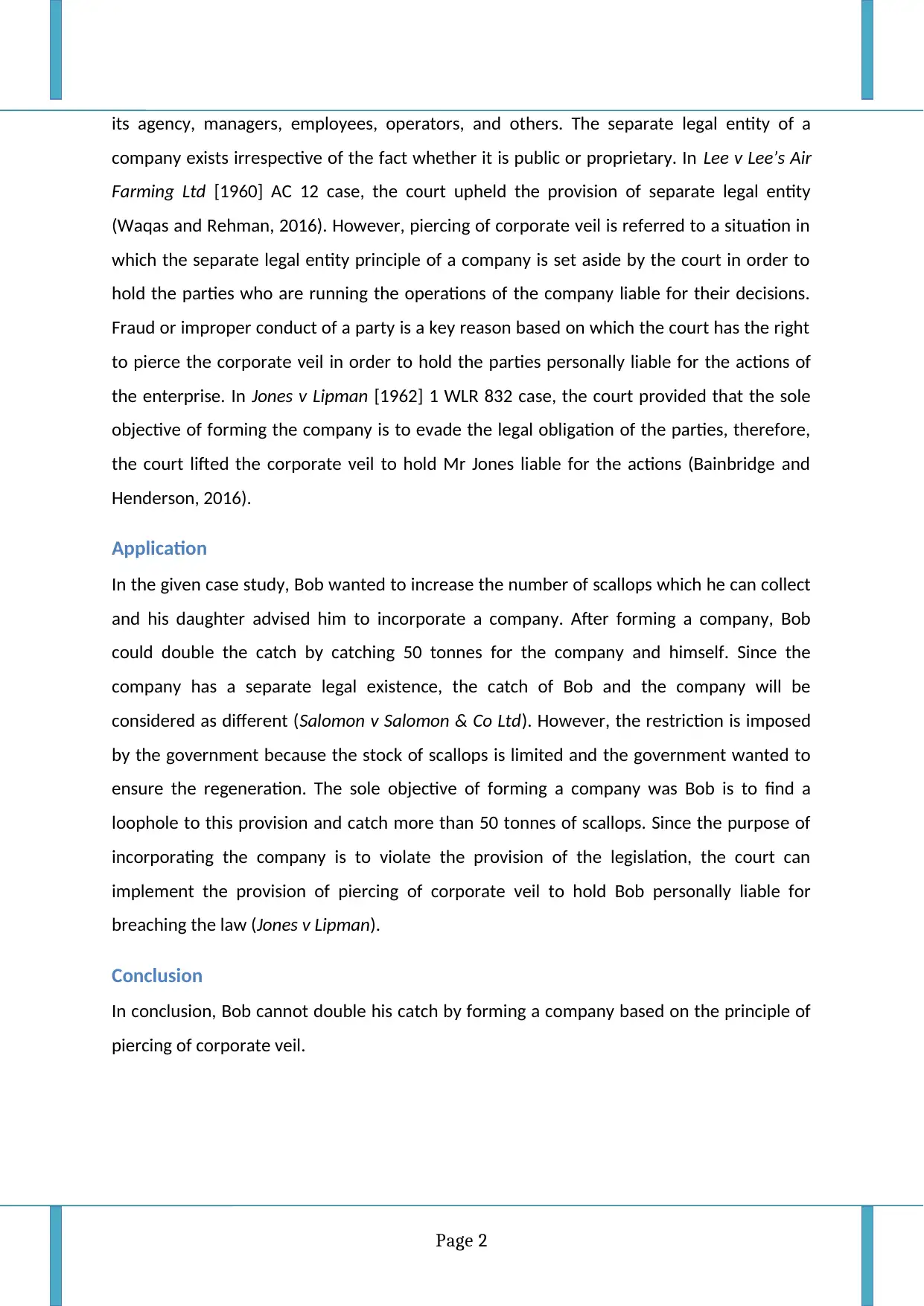
its agency, managers, employees, operators, and others. The separate legal entity of a
company exists irrespective of the fact whether it is public or proprietary. In Lee v Lee’s Air
Farming Ltd [1960] AC 12 case, the court upheld the provision of separate legal entity
(Waqas and Rehman, 2016). However, piercing of corporate veil is referred to a situation in
which the separate legal entity principle of a company is set aside by the court in order to
hold the parties who are running the operations of the company liable for their decisions.
Fraud or improper conduct of a party is a key reason based on which the court has the right
to pierce the corporate veil in order to hold the parties personally liable for the actions of
the enterprise. In Jones v Lipman [1962] 1 WLR 832 case, the court provided that the sole
objective of forming the company is to evade the legal obligation of the parties, therefore,
the court lifted the corporate veil to hold Mr Jones liable for the actions (Bainbridge and
Henderson, 2016).
Application
In the given case study, Bob wanted to increase the number of scallops which he can collect
and his daughter advised him to incorporate a company. After forming a company, Bob
could double the catch by catching 50 tonnes for the company and himself. Since the
company has a separate legal existence, the catch of Bob and the company will be
considered as different (Salomon v Salomon & Co Ltd). However, the restriction is imposed
by the government because the stock of scallops is limited and the government wanted to
ensure the regeneration. The sole objective of forming a company was Bob is to find a
loophole to this provision and catch more than 50 tonnes of scallops. Since the purpose of
incorporating the company is to violate the provision of the legislation, the court can
implement the provision of piercing of corporate veil to hold Bob personally liable for
breaching the law (Jones v Lipman).
Conclusion
In conclusion, Bob cannot double his catch by forming a company based on the principle of
piercing of corporate veil.
Page 2
company exists irrespective of the fact whether it is public or proprietary. In Lee v Lee’s Air
Farming Ltd [1960] AC 12 case, the court upheld the provision of separate legal entity
(Waqas and Rehman, 2016). However, piercing of corporate veil is referred to a situation in
which the separate legal entity principle of a company is set aside by the court in order to
hold the parties who are running the operations of the company liable for their decisions.
Fraud or improper conduct of a party is a key reason based on which the court has the right
to pierce the corporate veil in order to hold the parties personally liable for the actions of
the enterprise. In Jones v Lipman [1962] 1 WLR 832 case, the court provided that the sole
objective of forming the company is to evade the legal obligation of the parties, therefore,
the court lifted the corporate veil to hold Mr Jones liable for the actions (Bainbridge and
Henderson, 2016).
Application
In the given case study, Bob wanted to increase the number of scallops which he can collect
and his daughter advised him to incorporate a company. After forming a company, Bob
could double the catch by catching 50 tonnes for the company and himself. Since the
company has a separate legal existence, the catch of Bob and the company will be
considered as different (Salomon v Salomon & Co Ltd). However, the restriction is imposed
by the government because the stock of scallops is limited and the government wanted to
ensure the regeneration. The sole objective of forming a company was Bob is to find a
loophole to this provision and catch more than 50 tonnes of scallops. Since the purpose of
incorporating the company is to violate the provision of the legislation, the court can
implement the provision of piercing of corporate veil to hold Bob personally liable for
breaching the law (Jones v Lipman).
Conclusion
In conclusion, Bob cannot double his catch by forming a company based on the principle of
piercing of corporate veil.
Page 2
⊘ This is a preview!⊘
Do you want full access?
Subscribe today to unlock all pages.

Trusted by 1+ million students worldwide
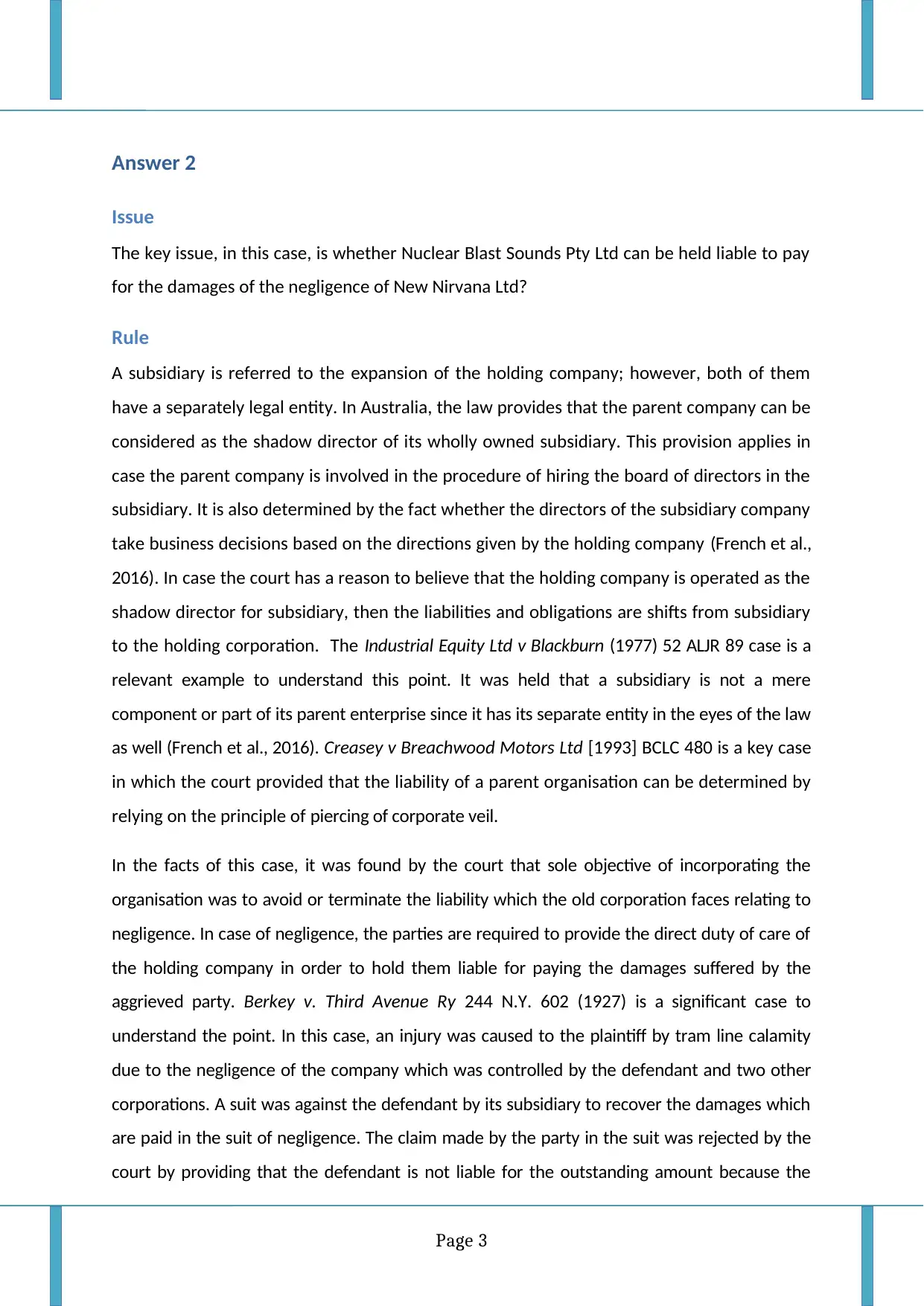
Answer 2
Issue
The key issue, in this case, is whether Nuclear Blast Sounds Pty Ltd can be held liable to pay
for the damages of the negligence of New Nirvana Ltd?
Rule
A subsidiary is referred to the expansion of the holding company; however, both of them
have a separately legal entity. In Australia, the law provides that the parent company can be
considered as the shadow director of its wholly owned subsidiary. This provision applies in
case the parent company is involved in the procedure of hiring the board of directors in the
subsidiary. It is also determined by the fact whether the directors of the subsidiary company
take business decisions based on the directions given by the holding company (French et al.,
2016). In case the court has a reason to believe that the holding company is operated as the
shadow director for subsidiary, then the liabilities and obligations are shifts from subsidiary
to the holding corporation. The Industrial Equity Ltd v Blackburn (1977) 52 ALJR 89 case is a
relevant example to understand this point. It was held that a subsidiary is not a mere
component or part of its parent enterprise since it has its separate entity in the eyes of the law
as well (French et al., 2016). Creasey v Breachwood Motors Ltd [1993] BCLC 480 is a key case
in which the court provided that the liability of a parent organisation can be determined by
relying on the principle of piercing of corporate veil.
In the facts of this case, it was found by the court that sole objective of incorporating the
organisation was to avoid or terminate the liability which the old corporation faces relating to
negligence. In case of negligence, the parties are required to provide the direct duty of care of
the holding company in order to hold them liable for paying the damages suffered by the
aggrieved party. Berkey v. Third Avenue Ry 244 N.Y. 602 (1927) is a significant case to
understand the point. In this case, an injury was caused to the plaintiff by tram line calamity
due to the negligence of the company which was controlled by the defendant and two other
corporations. A suit was against the defendant by its subsidiary to recover the damages which
are paid in the suit of negligence. The claim made by the party in the suit was rejected by the
court by providing that the defendant is not liable for the outstanding amount because the
Page 3
Issue
The key issue, in this case, is whether Nuclear Blast Sounds Pty Ltd can be held liable to pay
for the damages of the negligence of New Nirvana Ltd?
Rule
A subsidiary is referred to the expansion of the holding company; however, both of them
have a separately legal entity. In Australia, the law provides that the parent company can be
considered as the shadow director of its wholly owned subsidiary. This provision applies in
case the parent company is involved in the procedure of hiring the board of directors in the
subsidiary. It is also determined by the fact whether the directors of the subsidiary company
take business decisions based on the directions given by the holding company (French et al.,
2016). In case the court has a reason to believe that the holding company is operated as the
shadow director for subsidiary, then the liabilities and obligations are shifts from subsidiary
to the holding corporation. The Industrial Equity Ltd v Blackburn (1977) 52 ALJR 89 case is a
relevant example to understand this point. It was held that a subsidiary is not a mere
component or part of its parent enterprise since it has its separate entity in the eyes of the law
as well (French et al., 2016). Creasey v Breachwood Motors Ltd [1993] BCLC 480 is a key case
in which the court provided that the liability of a parent organisation can be determined by
relying on the principle of piercing of corporate veil.
In the facts of this case, it was found by the court that sole objective of incorporating the
organisation was to avoid or terminate the liability which the old corporation faces relating to
negligence. In case of negligence, the parties are required to provide the direct duty of care of
the holding company in order to hold them liable for paying the damages suffered by the
aggrieved party. Berkey v. Third Avenue Ry 244 N.Y. 602 (1927) is a significant case to
understand the point. In this case, an injury was caused to the plaintiff by tram line calamity
due to the negligence of the company which was controlled by the defendant and two other
corporations. A suit was against the defendant by its subsidiary to recover the damages which
are paid in the suit of negligence. The claim made by the party in the suit was rejected by the
court by providing that the defendant is not liable for the outstanding amount because the
Page 3
Paraphrase This Document
Need a fresh take? Get an instant paraphrase of this document with our AI Paraphraser
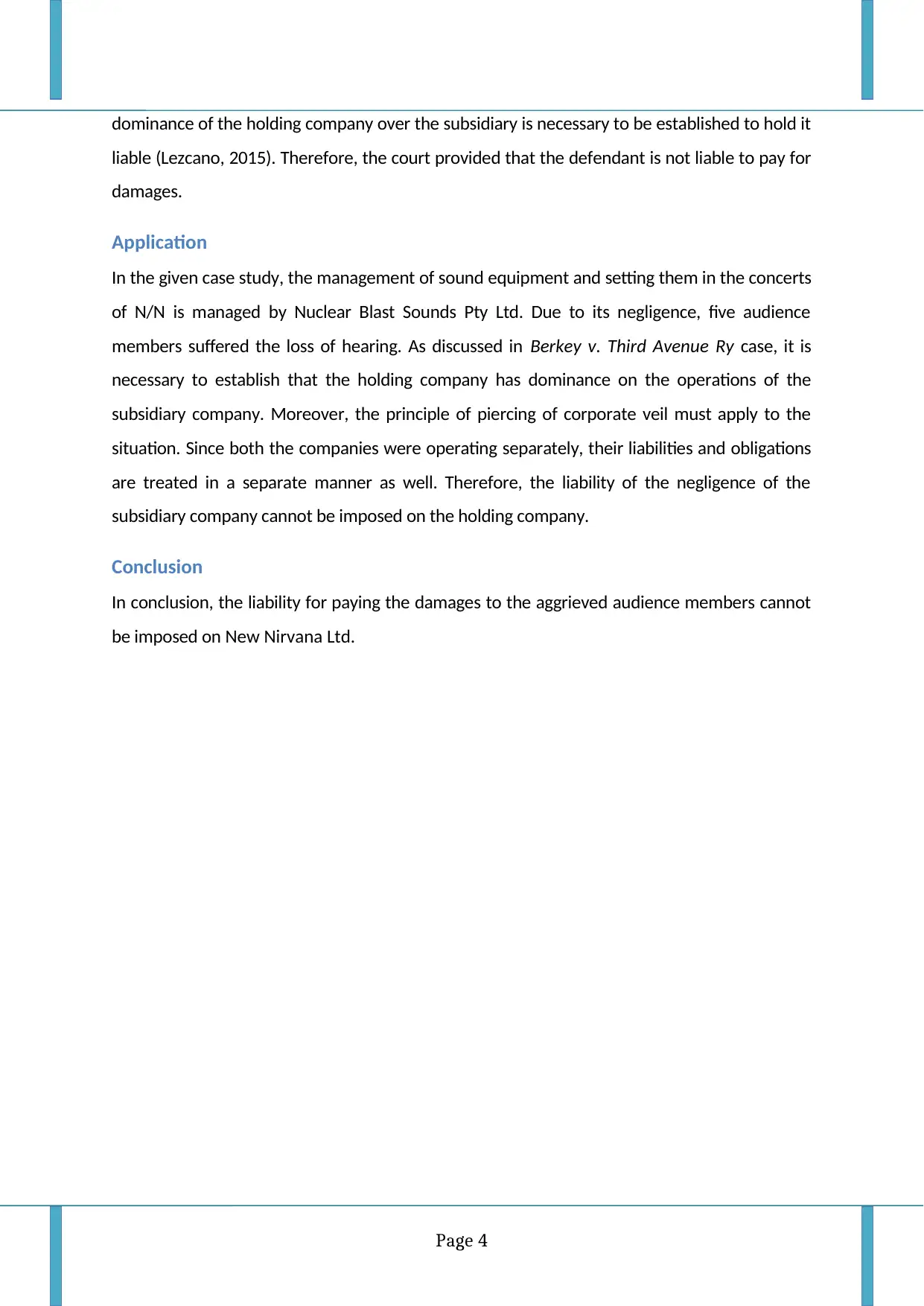
dominance of the holding company over the subsidiary is necessary to be established to hold it
liable (Lezcano, 2015). Therefore, the court provided that the defendant is not liable to pay for
damages.
Application
In the given case study, the management of sound equipment and setting them in the concerts
of N/N is managed by Nuclear Blast Sounds Pty Ltd. Due to its negligence, five audience
members suffered the loss of hearing. As discussed in Berkey v. Third Avenue Ry case, it is
necessary to establish that the holding company has dominance on the operations of the
subsidiary company. Moreover, the principle of piercing of corporate veil must apply to the
situation. Since both the companies were operating separately, their liabilities and obligations
are treated in a separate manner as well. Therefore, the liability of the negligence of the
subsidiary company cannot be imposed on the holding company.
Conclusion
In conclusion, the liability for paying the damages to the aggrieved audience members cannot
be imposed on New Nirvana Ltd.
Page 4
liable (Lezcano, 2015). Therefore, the court provided that the defendant is not liable to pay for
damages.
Application
In the given case study, the management of sound equipment and setting them in the concerts
of N/N is managed by Nuclear Blast Sounds Pty Ltd. Due to its negligence, five audience
members suffered the loss of hearing. As discussed in Berkey v. Third Avenue Ry case, it is
necessary to establish that the holding company has dominance on the operations of the
subsidiary company. Moreover, the principle of piercing of corporate veil must apply to the
situation. Since both the companies were operating separately, their liabilities and obligations
are treated in a separate manner as well. Therefore, the liability of the negligence of the
subsidiary company cannot be imposed on the holding company.
Conclusion
In conclusion, the liability for paying the damages to the aggrieved audience members cannot
be imposed on New Nirvana Ltd.
Page 4
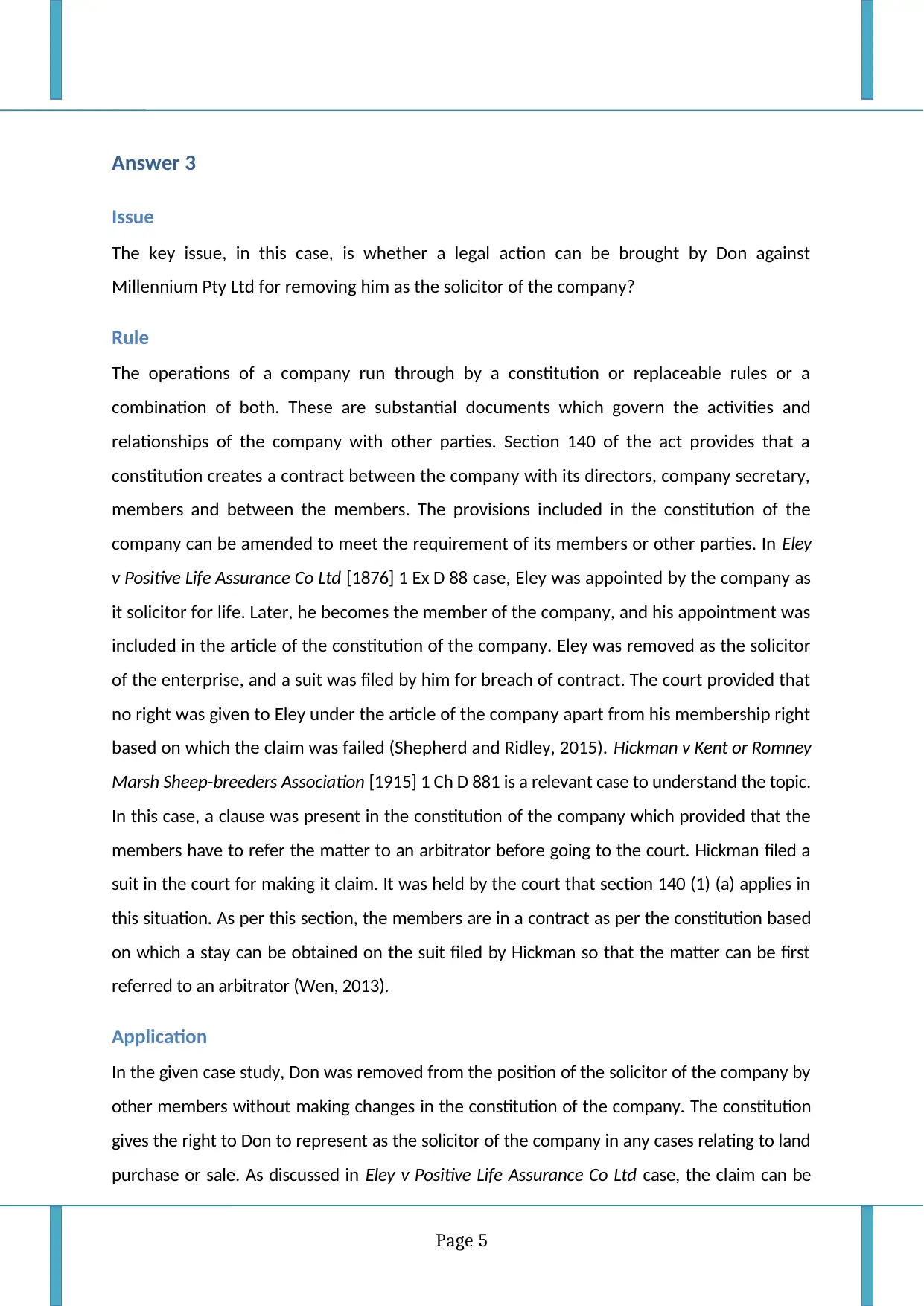
Answer 3
Issue
The key issue, in this case, is whether a legal action can be brought by Don against
Millennium Pty Ltd for removing him as the solicitor of the company?
Rule
The operations of a company run through by a constitution or replaceable rules or a
combination of both. These are substantial documents which govern the activities and
relationships of the company with other parties. Section 140 of the act provides that a
constitution creates a contract between the company with its directors, company secretary,
members and between the members. The provisions included in the constitution of the
company can be amended to meet the requirement of its members or other parties. In Eley
v Positive Life Assurance Co Ltd [1876] 1 Ex D 88 case, Eley was appointed by the company as
it solicitor for life. Later, he becomes the member of the company, and his appointment was
included in the article of the constitution of the company. Eley was removed as the solicitor
of the enterprise, and a suit was filed by him for breach of contract. The court provided that
no right was given to Eley under the article of the company apart from his membership right
based on which the claim was failed (Shepherd and Ridley, 2015). Hickman v Kent or Romney
Marsh Sheep-breeders Association [1915] 1 Ch D 881 is a relevant case to understand the topic.
In this case, a clause was present in the constitution of the company which provided that the
members have to refer the matter to an arbitrator before going to the court. Hickman filed a
suit in the court for making it claim. It was held by the court that section 140 (1) (a) applies in
this situation. As per this section, the members are in a contract as per the constitution based
on which a stay can be obtained on the suit filed by Hickman so that the matter can be first
referred to an arbitrator (Wen, 2013).
Application
In the given case study, Don was removed from the position of the solicitor of the company by
other members without making changes in the constitution of the company. The constitution
gives the right to Don to represent as the solicitor of the company in any cases relating to land
purchase or sale. As discussed in Eley v Positive Life Assurance Co Ltd case, the claim can be
Page 5
Issue
The key issue, in this case, is whether a legal action can be brought by Don against
Millennium Pty Ltd for removing him as the solicitor of the company?
Rule
The operations of a company run through by a constitution or replaceable rules or a
combination of both. These are substantial documents which govern the activities and
relationships of the company with other parties. Section 140 of the act provides that a
constitution creates a contract between the company with its directors, company secretary,
members and between the members. The provisions included in the constitution of the
company can be amended to meet the requirement of its members or other parties. In Eley
v Positive Life Assurance Co Ltd [1876] 1 Ex D 88 case, Eley was appointed by the company as
it solicitor for life. Later, he becomes the member of the company, and his appointment was
included in the article of the constitution of the company. Eley was removed as the solicitor
of the enterprise, and a suit was filed by him for breach of contract. The court provided that
no right was given to Eley under the article of the company apart from his membership right
based on which the claim was failed (Shepherd and Ridley, 2015). Hickman v Kent or Romney
Marsh Sheep-breeders Association [1915] 1 Ch D 881 is a relevant case to understand the topic.
In this case, a clause was present in the constitution of the company which provided that the
members have to refer the matter to an arbitrator before going to the court. Hickman filed a
suit in the court for making it claim. It was held by the court that section 140 (1) (a) applies in
this situation. As per this section, the members are in a contract as per the constitution based
on which a stay can be obtained on the suit filed by Hickman so that the matter can be first
referred to an arbitrator (Wen, 2013).
Application
In the given case study, Don was removed from the position of the solicitor of the company by
other members without making changes in the constitution of the company. The constitution
gives the right to Don to represent as the solicitor of the company in any cases relating to land
purchase or sale. As discussed in Eley v Positive Life Assurance Co Ltd case, the claim can be
Page 5
⊘ This is a preview!⊘
Do you want full access?
Subscribe today to unlock all pages.

Trusted by 1+ million students worldwide
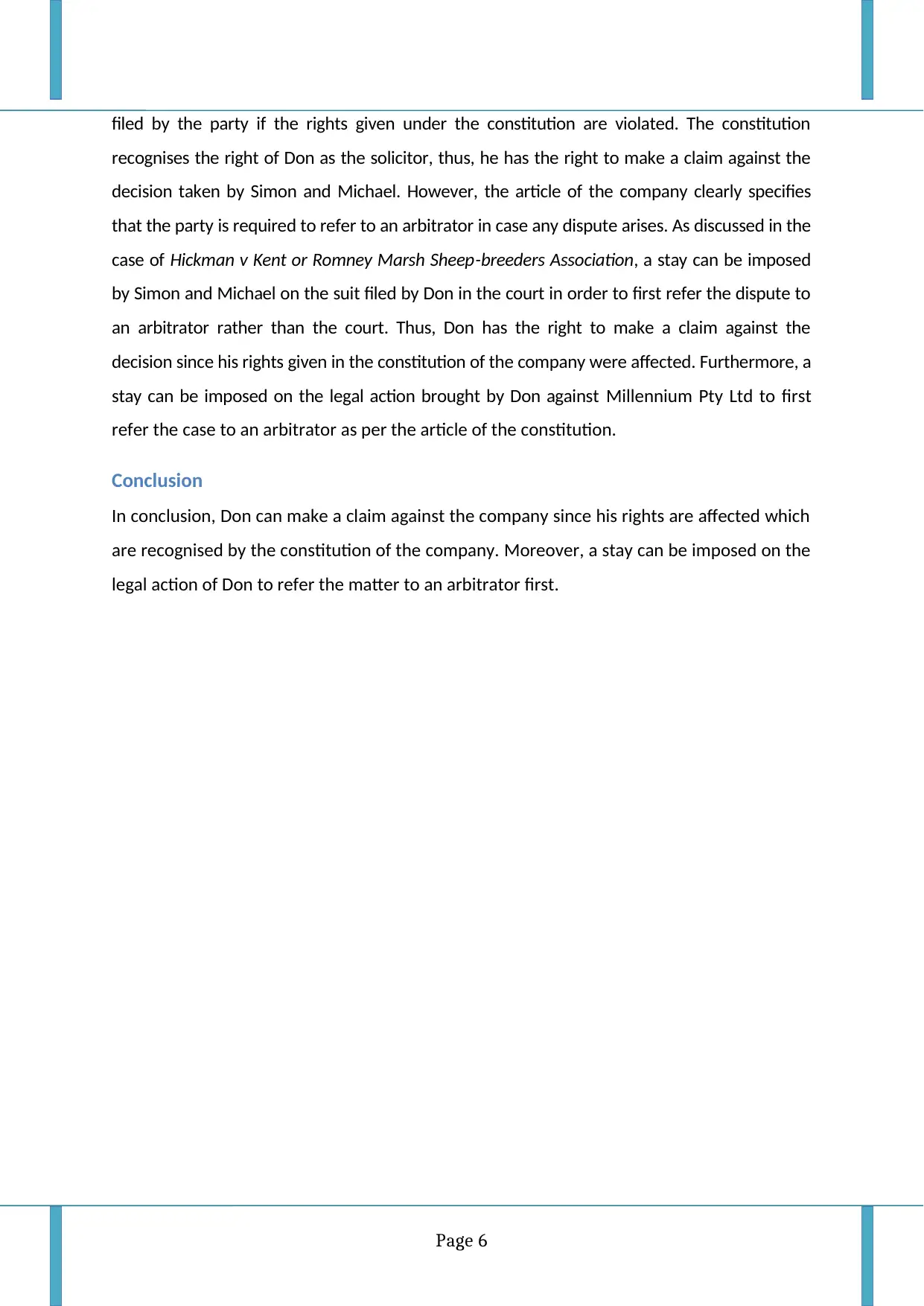
filed by the party if the rights given under the constitution are violated. The constitution
recognises the right of Don as the solicitor, thus, he has the right to make a claim against the
decision taken by Simon and Michael. However, the article of the company clearly specifies
that the party is required to refer to an arbitrator in case any dispute arises. As discussed in the
case of Hickman v Kent or Romney Marsh Sheep-breeders Association, a stay can be imposed
by Simon and Michael on the suit filed by Don in the court in order to first refer the dispute to
an arbitrator rather than the court. Thus, Don has the right to make a claim against the
decision since his rights given in the constitution of the company were affected. Furthermore, a
stay can be imposed on the legal action brought by Don against Millennium Pty Ltd to first
refer the case to an arbitrator as per the article of the constitution.
Conclusion
In conclusion, Don can make a claim against the company since his rights are affected which
are recognised by the constitution of the company. Moreover, a stay can be imposed on the
legal action of Don to refer the matter to an arbitrator first.
Page 6
recognises the right of Don as the solicitor, thus, he has the right to make a claim against the
decision taken by Simon and Michael. However, the article of the company clearly specifies
that the party is required to refer to an arbitrator in case any dispute arises. As discussed in the
case of Hickman v Kent or Romney Marsh Sheep-breeders Association, a stay can be imposed
by Simon and Michael on the suit filed by Don in the court in order to first refer the dispute to
an arbitrator rather than the court. Thus, Don has the right to make a claim against the
decision since his rights given in the constitution of the company were affected. Furthermore, a
stay can be imposed on the legal action brought by Don against Millennium Pty Ltd to first
refer the case to an arbitrator as per the article of the constitution.
Conclusion
In conclusion, Don can make a claim against the company since his rights are affected which
are recognised by the constitution of the company. Moreover, a stay can be imposed on the
legal action of Don to refer the matter to an arbitrator first.
Page 6
Paraphrase This Document
Need a fresh take? Get an instant paraphrase of this document with our AI Paraphraser
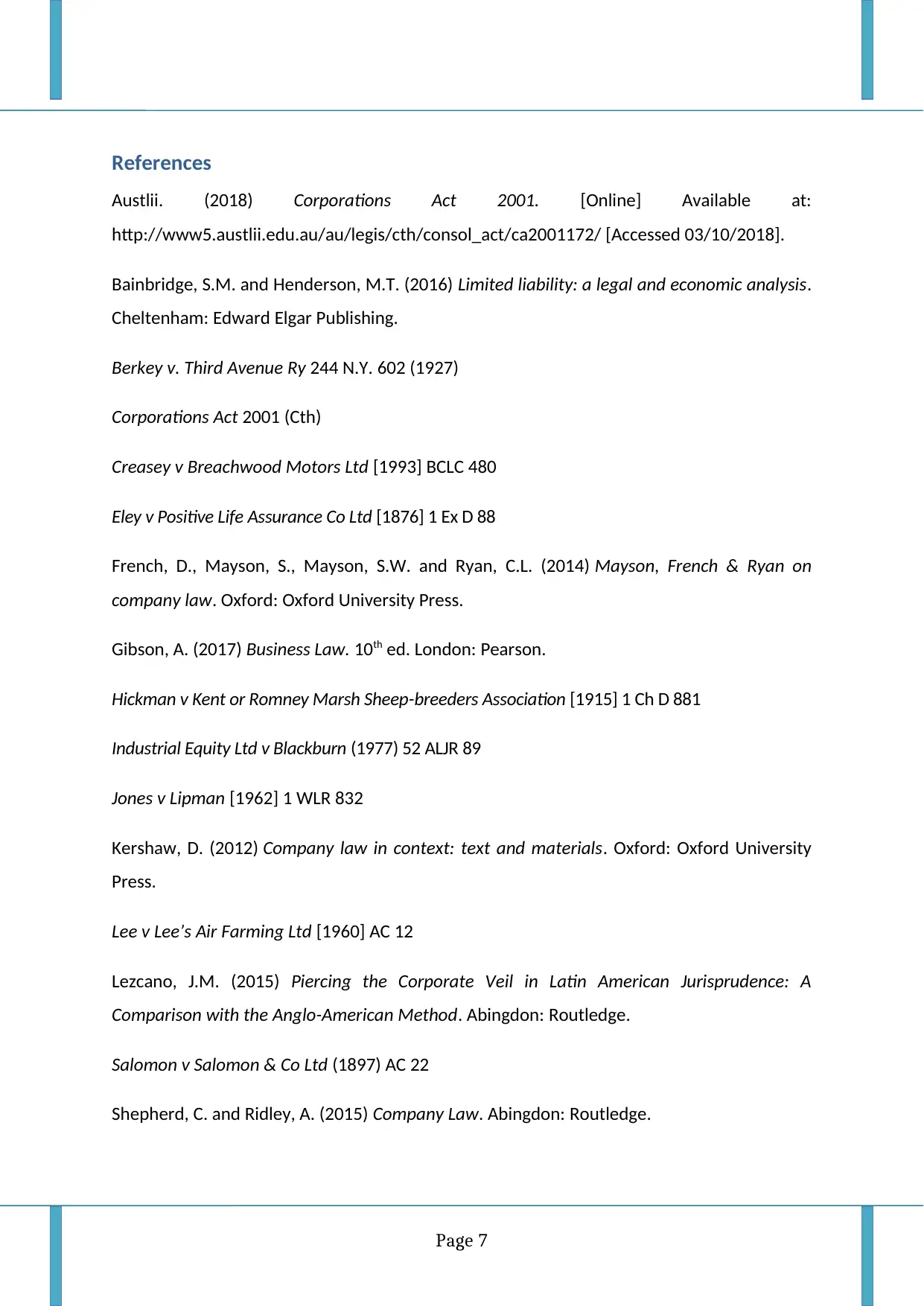
References
Austlii. (2018) Corporations Act 2001. [Online] Available at:
http://www5.austlii.edu.au/au/legis/cth/consol_act/ca2001172/ [Accessed 03/10/2018].
Bainbridge, S.M. and Henderson, M.T. (2016) Limited liability: a legal and economic analysis.
Cheltenham: Edward Elgar Publishing.
Berkey v. Third Avenue Ry 244 N.Y. 602 (1927)
Corporations Act 2001 (Cth)
Creasey v Breachwood Motors Ltd [1993] BCLC 480
Eley v Positive Life Assurance Co Ltd [1876] 1 Ex D 88
French, D., Mayson, S., Mayson, S.W. and Ryan, C.L. (2014) Mayson, French & Ryan on
company law. Oxford: Oxford University Press.
Gibson, A. (2017) Business Law. 10th ed. London: Pearson.
Hickman v Kent or Romney Marsh Sheep-breeders Association [1915] 1 Ch D 881
Industrial Equity Ltd v Blackburn (1977) 52 ALJR 89
Jones v Lipman [1962] 1 WLR 832
Kershaw, D. (2012) Company law in context: text and materials. Oxford: Oxford University
Press.
Lee v Lee’s Air Farming Ltd [1960] AC 12
Lezcano, J.M. (2015) Piercing the Corporate Veil in Latin American Jurisprudence: A
Comparison with the Anglo-American Method. Abingdon: Routledge.
Salomon v Salomon & Co Ltd (1897) AC 22
Shepherd, C. and Ridley, A. (2015) Company Law. Abingdon: Routledge.
Page 7
Austlii. (2018) Corporations Act 2001. [Online] Available at:
http://www5.austlii.edu.au/au/legis/cth/consol_act/ca2001172/ [Accessed 03/10/2018].
Bainbridge, S.M. and Henderson, M.T. (2016) Limited liability: a legal and economic analysis.
Cheltenham: Edward Elgar Publishing.
Berkey v. Third Avenue Ry 244 N.Y. 602 (1927)
Corporations Act 2001 (Cth)
Creasey v Breachwood Motors Ltd [1993] BCLC 480
Eley v Positive Life Assurance Co Ltd [1876] 1 Ex D 88
French, D., Mayson, S., Mayson, S.W. and Ryan, C.L. (2014) Mayson, French & Ryan on
company law. Oxford: Oxford University Press.
Gibson, A. (2017) Business Law. 10th ed. London: Pearson.
Hickman v Kent or Romney Marsh Sheep-breeders Association [1915] 1 Ch D 881
Industrial Equity Ltd v Blackburn (1977) 52 ALJR 89
Jones v Lipman [1962] 1 WLR 832
Kershaw, D. (2012) Company law in context: text and materials. Oxford: Oxford University
Press.
Lee v Lee’s Air Farming Ltd [1960] AC 12
Lezcano, J.M. (2015) Piercing the Corporate Veil in Latin American Jurisprudence: A
Comparison with the Anglo-American Method. Abingdon: Routledge.
Salomon v Salomon & Co Ltd (1897) AC 22
Shepherd, C. and Ridley, A. (2015) Company Law. Abingdon: Routledge.
Page 7
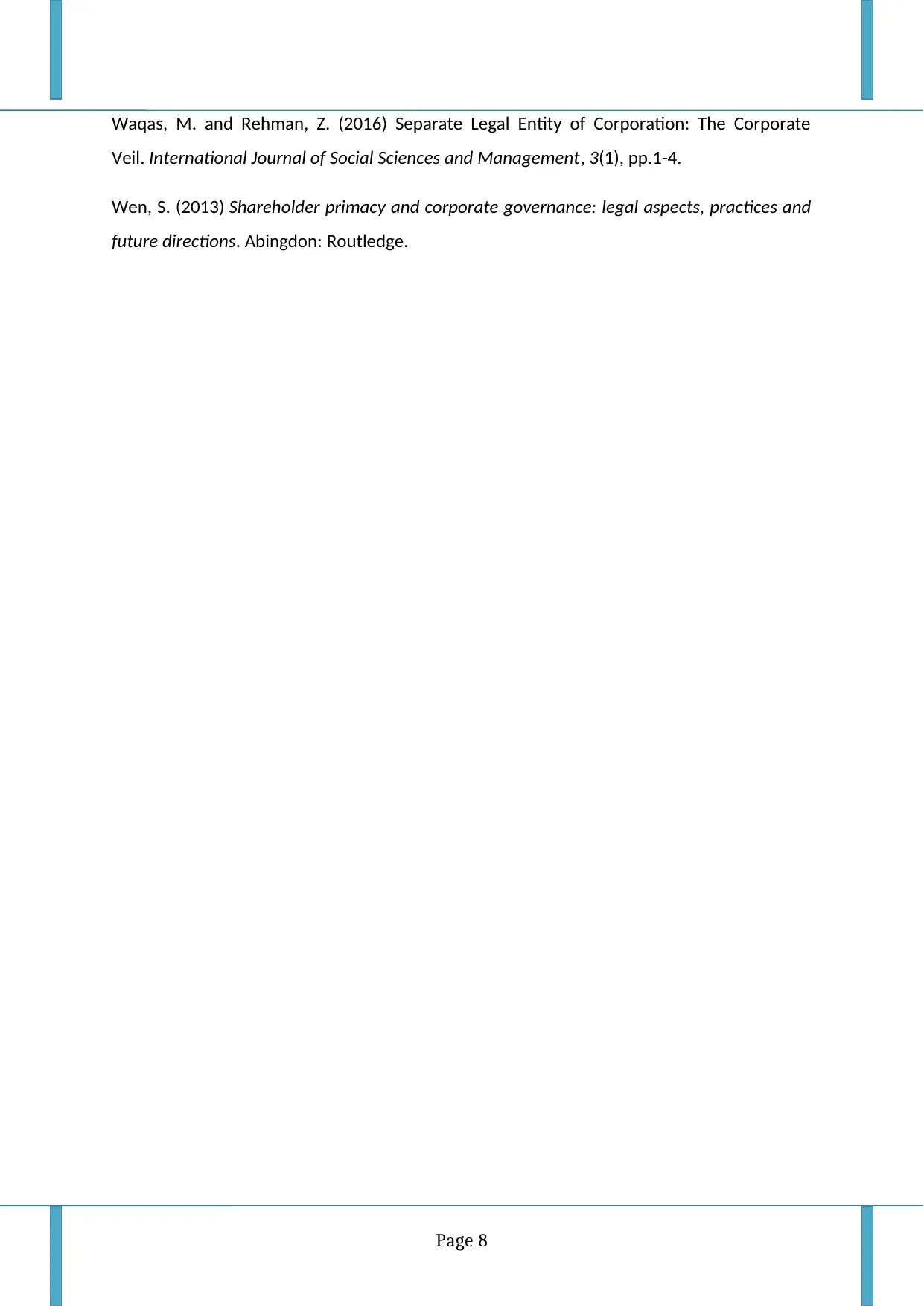
Waqas, M. and Rehman, Z. (2016) Separate Legal Entity of Corporation: The Corporate
Veil. International Journal of Social Sciences and Management, 3(1), pp.1-4.
Wen, S. (2013) Shareholder primacy and corporate governance: legal aspects, practices and
future directions. Abingdon: Routledge.
Page 8
Veil. International Journal of Social Sciences and Management, 3(1), pp.1-4.
Wen, S. (2013) Shareholder primacy and corporate governance: legal aspects, practices and
future directions. Abingdon: Routledge.
Page 8
⊘ This is a preview!⊘
Do you want full access?
Subscribe today to unlock all pages.

Trusted by 1+ million students worldwide
1 out of 9
Related Documents
Your All-in-One AI-Powered Toolkit for Academic Success.
+13062052269
info@desklib.com
Available 24*7 on WhatsApp / Email
![[object Object]](/_next/static/media/star-bottom.7253800d.svg)
Unlock your academic potential
Copyright © 2020–2026 A2Z Services. All Rights Reserved. Developed and managed by ZUCOL.




